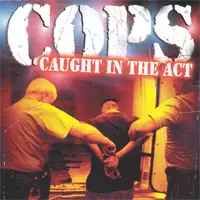It will be hard to escape the legacy of Cops and other fear-mongering crime shows
-

The cancelation of Cops and Live PD this week are positive steps in reversing TV's flawed police portrayals, but that won't change how viewers have been hard-wired for decades to see the police point of view. "A TV series is a ride-along," says James Poniewozik. "It places you in the perspective of the protagonist, whether that protagonist is valorized or not. We have spent innumerably more hours looking through the windshield from the perspective of the police than of the policed. If we’re going to continue to have crime shows, better to have more thoughtful, nuanced ones. But I’m less optimistic about the ability of TV to overcome its cultural wiring, which is to use the easy, perpetual engine of conflict that crime stories provide: Someone bad did something bad, and someone good needs to catch them. The changes coming from the wave of protests across America may be deep and have lasting effects. They may even mean a generational change in attitudes among the people participating, or those listening to them. But that will run up against generations of narratives in the minds of Americans who have unwound in front of the TV for decades. No one, after all, forced those broadcast audiences to sit down for those still relatively popular nightly hours of crime. And when a politician goes on Twitter or stands at a convention declaring for 'LAW & ORDER!' those viewers have an enormous mental library of images to illustrate the slogan."
ALSO:
- For decades, Cops was a key component of American law enforcement’s manicured self-image: "The show presented itself as an apolitical documentary record of What It’s Like for Police, assembled in the spirit of Sgt. Joe Friday, the uber-cop hero of Dragnet," says Matt Zoller Seitz. "But this presentation was loaded with its own, unremarked-upon assumptions. Chief among them was the idea that police are innately decent, disinterested, caring people who are mostly great at what they do, and screw up only because of unrelenting pressure and threat of death or injury, as well as the public’s inability to understand and respect how tough the job is (downsides that Cops tried to refute by consistently presenting citizens as irresistible forces and police as immovable objects). The series rarely showed police as troubled by anything but lack of funding or public support. Corruption, cynicism, or incompetence were rarely acknowledged and never examined at length. Nor did the show get into the disproportionate effect of police brutality on poor and/or minority citizens or the greater likelihood of police interrogating or arresting them in the first place. Following journalism’s 'if it bleeds, it leads' dictum, Cops focused on street crime and minor disturbances, often involving working-class or poor people, never on corporate or white-collar criminals."
- Cops was criticized when it premiered in 1989: “The dominant image is hammered home again and again: the overwhelmingly white troops of police are the good guys; the bad guys are overwhelmingly black,” the New York Times wrote upon its premiere on Fox. “Little is said about the ultimate sources of the drugs, and nothing is mentioned about Florida’s periodic scandals in which the police themselves are found to be trafficking in drugs.” A Los Angeles Times review noted that “the camera assumes the disgusting role of hanging judge by prematurely filling the screen with the faces of numerous suspects swept up in drug busts, some of whom may turn out to be innocent or may even go uncharged, for all we know.”
- Disney, which distributes Cops reruns to local stations, is in talks to provide replacement shows
TOPICS: Cops, A&E, FOX, Paramount Network, Live PD, George Floyd, Black Lives Matter, Disney
